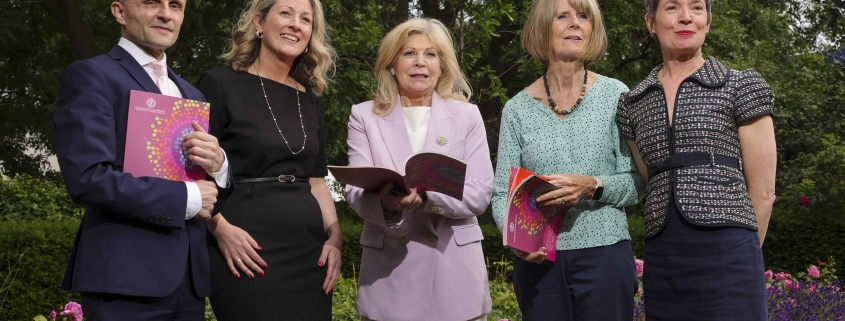The Adoption Authority of Ireland Launches 70-Year Retrospective Report on the Irish Domestic Adoption Process
The Adoption Authority of Ireland (AAI) launched a research report entitled “Reflections on the Irish Domestic Adoption Process 1952–2022” at an event in the Museum of Literature Ireland (MoLI), Dublin 2 last evening.
This report, based on a study led by the AAI’s Research Officer, Dr. Judy Lovett, offers an in-depth exploration of the Irish domestic adoption process over seven decades, capturing experiences from both voluntary and professional perspectives. The report draws from interviews with 14 individuals involved in domestic adoption, conducted between 2021 and 2022, just before the enactment of the Birth Information and Tracing Act in June 2022.
The Birth Information and Tracing Act 2022 provides a full and clear right of access to birth certificates, birth and early life information for all persons who were adopted, boarded out or nursed out, subject to an illegal birth registration, or resided in a mother and baby home or county home institution as a child.
The primary aim of the research upon which the report launched today is based, is to provide nuanced insights into the experiences of individuals involved in adoption, either on a voluntary basis (activists and advocates) or professional basis (social workers, legal professionals, academics). The main objective was to capture individual experiences of how adoption was facilitated, how it worked in practice, how decisions were made and how it changed over the 70 years from 1952 to 2022.
The significance of this Reflections Report conducted and published by the AAI is notable. The study set out to answer the following research questions:
- What are the individual experiences of professionals and volunteers working in the area of domestic adoption in Ireland?
- What were the main challenges of working in this field, and how did they change over time?
- How did legislative and policy changes over the years impact the practice of domestic adoption?
- How did these experiences differ pre- and post the changes brought about by the Adoption Act 2010?
Key findings include the persistent culture of secrecy; the salience of adoption-related information; and how individuals used personal agency to effect change. The report also highlights important legislative changes that impacted domestic adoption over the period spanning from 1952 to 2022.
The Chair of the AAI Board, Orlaith Traynor, highlighted the report’s significance, saying, “This Reflections Report provides a unique account of the efforts by multiple parties to introduce legislation providing for information and tracing. In 1983, the Adoption Board highlighted, through its Annual Report, that it was receiving an increasing number of requests for birth information from adopted people. Demand for birth information continued to grow in the years that followed, the Board continued to highlight it as an issue, and in 2005 the Board established the Information and Tracing Unit and the National Adoption Contact Preference Register (NACPR).”
Speaking about the report, Minister for Children, Equality, Disability, Integration and Youth, Roderic O’Gorman TD said: “This report explores how the Irish domestic adoption process has developed over the past 70 years, since adoption was first legislated for in this country. Its key findings mirror the personal accounts, views and experiences of the many advocates, stakeholders and survivors, I have personally engaged with, during my time as Minister. That is why I endeavored to bring about much needed change: change that would bring about a culture of access and release, returning the power from those holding adoption-related information to those who had the right to their own identities. The result was the landmark Birth Information and Tracing Act 2022.”
As noted in the report, “while activism in Irish adoption is not new, it was traditionally led by social workers, adoptive parents or other concerned parties. Since the early 1990s, however, the voice of the adoptee has come to the fore. Supported by advocates and allies, people personally affected by adoption in Ireland have been establishing their rightful position in the discourse around adoption.”
There has undoubtedly been significant change and progress in domestic adoption across this 70-year timeframe. This study acknowledges the culture of secrecy which became endemic in domestic adoption, and looks forward to the future with a very positive step in the right direction with the Birth Information and Tracing Act 2022.
Speaking about the AAI’s statutory research function, Ms. Traynor points to its significance for the Authority and informing its work and said: “The research section was set up five years ago under functions ascribed to the Authority under s. 96 (d) of the Adoption Act 2010. It has been of invaluable assistance to the Board of the AAI in terms of informing us of trends and findings and thus assisting us in our strategic planning and also in terms of our future direction. To our knowledge, the AAI is the only Central Authority under the Hague Convention on the Protection of Children and Co-operation in Respect of Intercountry Adoption with a standalone research section and we are justifiably proud of the advances made under the direction of Dr. Lovett. For anyone interested in adoption, this report makes for compelling reading.”
The report is available here: https://aai.gov.ie/en/what-we-do/research/aai-research/domestic-adoption-research-reports.html





